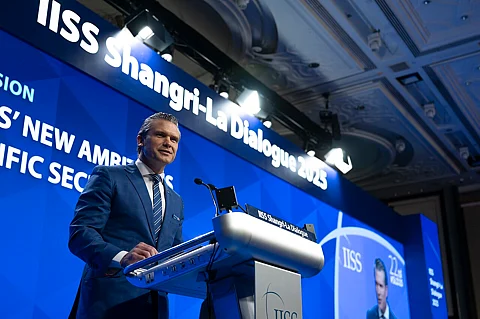

U.S. Defense Secretary Pete Hegseth will not attend a high-profile NATO-led meeting of more than 50 defense ministers in Brussels on Wednesday, marking the first absence by a Pentagon chief since the group was formed three years ago to coordinate military aid for Ukraine.
The move is likely to be seen as another signal of Washington’s shifting stance on Ukraine amid Russia’s ongoing invasion. A U.S. Department of Defense spokesperson confirmed Hegseth’s absence from the Ukraine Defense Contact Group (UDCG) meeting, citing scheduling conflicts. U.S. Ambassador to NATO Matthew Whitaker will represent Washington instead. Hegseth is expected to attend Thursday’s NATO defense ministers’ meeting.
Since its creation in 2022 by then-Defense Secretary Lloyd Austin, the UDCG has facilitated over $126 billion in military assistance to Ukraine, including more than $66.5 billion from the U.S. But under President Donald Trump’s administration, which took office in January, no new U.S. weapons packages for Kiev have been announced.
In February, Hegseth handed leadership of the UDCG to Germany and the U.K., stating the U.S. would no longer steer the monthly meetings.
This week’s meetings are expected to finalize proposals to raise NATO members’ defense spending from 2% to 5% of GDP—a target pushed by Trump and endorsed by NATO Secretary-General Mark Rutte. The proposal, set to be discussed at the alliance’s June summit in The Hague, would allocate 3.5% of GDP to direct defense spending and 1.5% to "defense-related" initiatives, such as cybersecurity and critical infrastructure.
Currently, none of NATO’s 32 members, including the U.S., meet the 5% threshold. A NATO official told Euronews that the 3.5% benchmark aligns with U.S. spending levels. However, debates remain over what qualifies as "defense-related" expenses, with some nations advocating for broader definitions, including military mobility projects like road construction.
The proposed increase reflects Washington’s insistence that Europe take greater responsibility for its own security.
Russia’s war in Ukraine will dominate the Hague summit, though the tone is expected to differ sharply from last year’s gathering in Washington, where Ukrainian President Volodymyr Zelenskyy played a central role amid strong U.S. support under the Biden administration.
Zelenskyy confirmed this week that Ukraine has received an invitation to the summit, but his level of participation remains unclear, as Kiev is not a NATO member. Dutch King Willem-Alexander is expected to host Zelenskyy at a leaders’ dinner on the summit’s opening night.
Meanwhile, recent Ukrainian drone strikes on Russian air bases—which Kiev claims destroyed nearly a third of Moscow’s bomber fleet—have been hailed as tactical successes. Yet NATO officials caution that these operations have not halted Russia’s incremental territorial gains.
"The hard battlefield reality is that Russia is advancing square kilometer by square kilometer," a NATO official told Euronews. "Sunday’s success doesn’t change that."
The meetings come as peace talks between Moscow and Kiev remain stalled, with no breakthroughs reported after a second round of negotiations this week.